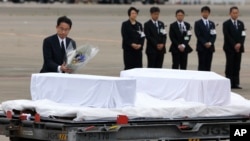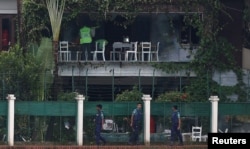Japan's Foreign Minister Fumio Kishida said Tuesday he felt "deep sorrow and strong indignation" as the bodies of seven Japanese nationals killed in an attack at a restaurant in Bangladesh returned home.
The victims were among 20 hostages and two police officers killed Saturday in Dhaka.
"It is my utmost pain that the precious lives were lost by the cruel and heinous terrorism which led to this regretful end," Kishida said.
He pledged that Japan would work with the international community to ensure such an attack would not happen again.
Bangladeshi security officials initially said officers killed six attackers and captured another who carried out the siege. But senior police official Saiful Islam said Tuesday one of those killed may have been a hostage who worked at the restaurant.
Police rescued 13 hostages, five of whom were still being detained, though it is not clear if they are suspects or being questioned to fill in more details about the attack.
Bangladeshi police chief A.K.M. Shahidul Haque said Monday that two men, including a suspected militant, were being interrogated. He declined to say whether the two men had been among those counted as hostages but acknowledged they were being treated in a hospital for injuries.
Islamic State claimed responsibility for the attack, but so far there is no confirmation of a link between the group and the attackers. Government officials deny there was any Islamic State involvement.
Home Minister Asaduzzaman Khan said instead the militants were members of a homegrown group - Jumatul Mujahedeen Bangladesh, or JMB - which has been banned in the country for more than a decade.
String of terror attacks
Bangladesh has seen a number of attacks in recent months, mostly targeting secular bloggers, atheists and religious minorities. IS terrorists and al-Qaida in the Indian subcontinent (AQIS) have claimed responsibility for many of the attacks.
The United States declared AQIS a “foreign terrorist organization” Thursday and called its leader, Asim Umar, a “specially designated global terrorist.”
Al-Qaida leader Ayman al-Zawahiri announced the formation of the group on the Indian subcontinent in 2014 and Umar has appeared in al-Qaida publications as the leader of the Indian offshoot. Umar is believed to be based in Pakistan, but was born in India in the mid-1970s.





